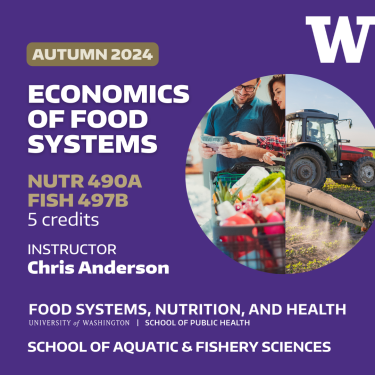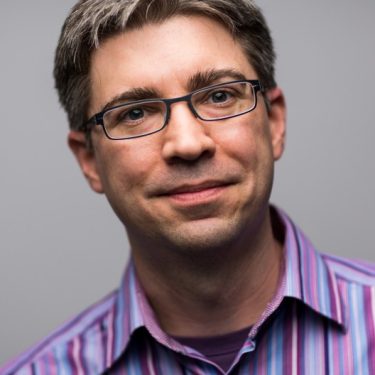Economics of Food Systems offered as new course for autumn 2024
How is our food system shaped by the choices of consumers, retailers, farmers, and fish harvesters?
If you’re interested in food and food policy, NUTR 490/FISH 497B Special Topics: Economics of Food Systems is a new undergraduate course offered in autumn 2024 by the University of Washington School of Aquatic and Fishery Sciences, in conjunction with the Food Systems, Nutrition, and Health Program in the School of Public Health, which explores the economic forces that shape individual decisions and overall outcomes in our food system.

Register for:
- NUTR 490A or FISH 497B Special Topics: Economics of Food Systems
- 5 credits
- MWF
- View seat availability
This course builds on familiarity with microeconomics, introducing models that are important for the food system. ECON200, FISH/ECON230, ESRM235 or equivalent are highly recommended.
Instructor
This new 5-credit course is taught by Professor Chris Anderson, of the UW School of Aquatic and Fishery Sciences. Chris is an economist who works in the U.S. and globally, studying how fishery policies affect the behavior of fishers, their relationships with processors, and consumer perceptions.
What you’ll learn:
Broadly, this course aims to develop your skills in using economic models to precisely explain how food system outcomes are an emergent property of individual decisions, and critically evaluate the tradeoffs associated with alternative policies for achieving improved economic, social, environmental or health objectives.
Course work will include:
- Studying the factors that shape behavior for consumers, retailers, wholesalers and traders, producers (farmers and fish harvesters), and their suppliers.
- Considering the incentives that govern the decisions they make, including social, market, and policy and regulatory forces.
- Critically evaluating tradeoffs within the food system for the food people eat, whose livelihoods are supported in the food system, and effects on resources and the environment.
- Using economic models to predict how policy options can alter individual decisions to shift social and economic outcomes.
- Applying a political economy framework to identify incentives within the political and regulatory system and predict political feasibility.
Plus much more!
The course will travel through the food system studying the factors that shape behavior for actors at each stage, including consumers, retailers, wholesalers and traders, producers (farmers and fish harvesters), and their suppliers.
————————–
About the Instructor

Chris Anderson is a professor in the School of Aquatic & Fishery Sciences at the University of Washington. His work focuses on understanding how the incentives presented by natural resource management affect outcomes for resource users. As an economist, he draws on tools in game theory, econometrics and experimental economics to understand how management operates in different resource and market contexts. In data rich fisheries, he models the choices of individual food system actors to understand how management alters individual behavior and aggregate outcomes. Recent projects include understanding why consumers feel differently about farming fish than farming beef, chicken and pork; and an economically sophisticated management strategy evaluation showing processors do not create value from the larger sockeye runs that would be associated with increased escapement goals in Bristol Bay. He also leverages insights from data rich studies and the Fishery Performance Indicators (FPIs) framework in low income countries, to co-create guidance for leveraging fishery resources into sustainable food and livelihoods for harvesters, processors and traders, and communities. He is a frequent collaborator in numerous fisheries around the world which gives him a cross-sectional perspective that includes designing and facilitating workshops to develop theories of change for fishery improvement projects, supported by systematic data from around the world. He earned his PhD in Social Science from the California Institute of Technology, and an ScB in Applied Math and Economics from Brown University.
April 30, 2024